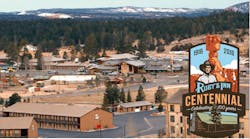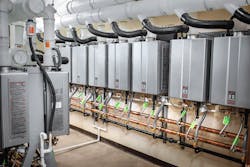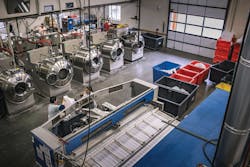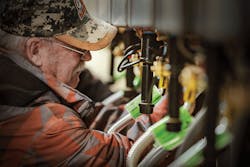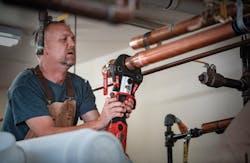Case Study by Rinnai America
Opened more than a century ago, historic Ruby’s Inn in Bryce Canyon City, UT, is a 19-building resort, located just outside Bryce Canyon National Park. It includes three hotels, 700 rooms, three restaurants, an RV park, campground, three swimming pools, and a laundry facility that does 19 tons of laundry per day. The city, itself, is home to just 195 permanent, year-round residents. But on any given day during the summer season, April through October, the city hosts 4,000 visitors.
Those visitors, including many who arrive all at once in tour groups, tested the limits of Ruby’s Inn’s previous water heater infrastructure. That infrastructure couldn’t handle so many guests showering at the same time. Plus, there was no redundancy system in place, so when one of the boilers would go down, it would take close to an hour before it could recover. This led to complaints from hotel guests about hot water issues.
“We can have six tour buses check in at one time, so there can be a lot of demand for hot water for showers all at once,” said Ron Harris, health and safety manager at Ruby’s Inn. “I have been here 25 years and we’ve always had hot water trouble. We’ve had all kinds of boilers over the years,” Harris added. “When a boiler went down, we would go two hours without hot water. You can imagine how unhappy that made the guests. We were giving away $60,000 a year in discounts and refunds.”
With all that in mind, teams from Ruby’s Inn, Rinnai, and propane sales and service provider Blue Star Gas worked together to develop, install, and maintain a water heater system that would meet the broad needs of such a busy facility. The new system provides greater capacity and reliability than the previous system. That, in turn, means a happy commercial customer that is better able to satisfy its customers and save money while doing so.
The Presentation
Steve Rutherford, division manager with Blue Star Gas, had started the ball rolling when he invited two Rinnai representatives to the facility to meet with two managers of the resort.
“Headaches and higher utility bills” are what lead many commercial consumers of propane to decide it’s time to upgrade their equipment, said Carlos Rodriguez, western U.S. energy business development manager with Rinnai. He was one of the two Rinnai reps who visited the facility.
“We ask dealers to uncover opportunities and then give us a call,” Rodriguez said. “Our commercial manager does a needs analysis; he calculates the load, designs a solution, and recommends products. For different sorts of commercial customers, we have designated teams—restaurants, hospitals, builders, new construction… We have a specialist in every field.”
In this case, the commercial manager was Brian Watts and his solution was a system of tankless water heaters. Watts was the other Rinnai rep to make that initial visit to Ruby’s Inn with Rodriguez.
“What appealed to (the resort) were the features and benefits, the efficiency, and, what was most important, the reliability,” recalled Watts, senior commercial business manager and national account manager at Rinnai. “We provide that reliability through redundancy. Tankless water heaters offer built-in redundancy. When a boiler breaks down, you are 100% out of water. But if you have six to 10 tankless water heaters, when something happens to one unit, the others will still do the job. That’s why we are so successful in the hospitality industry. If you’re a commercial business—a hotel, a hospital, a restaurant–you have to have hot water or you can’t keep your doors open.”
The Ruby’s Inn managers they met with were health and safety manager Harris and facilities manager Karl Munford.
“They presented their on-demand water heater,” said Harris. “It was not a normal sales pitch, which is something we see all the time. Instead, they just showed us what they have and what they could do. They went through every building and put together a binder of engineering specs. They also explained that if the system was installed by an authorized dealer, they would warranty it and make sure it does what they said it would do.”
The Solution
When a boiler went down last fall, Ruby’s Inn ordered a Rinnai rack system to replace it. This was still during the busy summer season, so the new system was put to the test. Four months later, after the system had passed that test, the owner decided to add new systems to its other facilities. Rinnai put together a proposal for a complete, turnkey solution for everything from the initial design and engineering to customer service and tech support.
The solution included 214 Rinnai appliances: 175 tankless water heaters, 35 tankless rack systems, and four Demand Duos. The Demand Duo is a hybrid water heating system that combines both tank and tankless technologies.
“The old system was very inefficient,” said Michael Prayoonvech, P.E., senior application engineer with Rinnai. “They had traditional boilers and storage plus some tank-style water heaters and a few small, tankless heaters. When you rolled up the door to the boiler room, you would feel the heat right away. As an engineer, when you feel that heat, you know that system is inefficient. Their old system was only 50% to 60% efficient.
“Their old system was also undersized, which meant they had a lack of hot water,” he added. “That was their biggest complaint. In hospitality, that is one of the things you expect to have—hot water. The advantage we have with tankless is, if you size the system properly, you will not run out of hot water.
“Another advantage is tracking the load,” Prayoonvech said. “If a person wants hot water at 2 a.m., our heaters fire up just enough to provide what is needed at that time. With the older system, you don’t have that; you fire up a whole boiler to provide just that small amount of hot water. That is inefficient, (so) the savings there can be huge.”
“People know that storing water and heating it and reheating it is not efficient; it is more efficient to heat it only when you need it,” he added. “The tankless technology does not necessarily sell itself, but people do understand that there will be a savings there. If you are at 60% energy efficiency and I’m at 100%, you can cut your energy bill by 30% to 40%. The capital cost is higher up front, but look at what you will save over the year.”
While tankless water heaters were used to meet most of the facility’s needs, Demand Duos were used for the laundry facility. Rinnai’s Demand Duo features a tankless water heater connected to a storage tank.
“The Demand Duos, we put in the laundry,” Prayoonvech explained. “Ruby’s Inn went with that because they wanted the upfront storage. A commercial washer requires a lot of water upfront. It would take three tankless heaters to provide the amount of water upfront, at one time, that one Demand Duo can provide. In their laundry, Ruby’s was looking to fire up all their washers at one time. So, they went with eight Demand Duos instead of 24 heaters.”
The Fuel: Propane
The Rinnai appliances used in the Ruby’s Inn project are fueled by propane. The location is very remote, so natural gas is not an option. There is no gas line within 25 or 30 miles. The resort is fueled by a 30,000-gal. propane cylinder and an 18,000-gal. propane cylinder.
“The only other option here is electricity, which is much more expensive than propane,” said Harris. “Natural gas isn’t even close to us. We’ve tried solar, but it is not an option for the kind of demand we have. We go through 425,000 gallons of propane per year.”
“This place could not exist without propane,” said Watts. “It is very remote. It is four hours from Salt Lake City and four hours from Las Vegas. In my opinion, without propane, it could not be as large or it would not exist.”
The Installation
After Rinnai engineered the system, Blue Star Gas, a propane sales and service provider with 14 locations in five western states, installed it.
“We have always been a full-service marketer,” explained Jeff Stewart, president of Blue Star Gas. “Blue Star did not have the gas load, but the size of the project made it worthwhile for us to do it,” Stewart added. “The size and scope of this project made sense for us to participate in it. We are able to bring resources from other divisions to help with projects that are too big for one division.”
Blue Star’s Rutherford added, “We did it all in-house; there was no contracting. That is what Ruby’s Inn wanted. They knew I would be here in the long run, because I am here all the time maintaining the gas system. That is a big deal when you are this far from everything.”
Once installed, the system provided a tangible sign that energy was being saved. “It can get as much as 40 degrees below freezing here during the winter,” said Harris. “Employees used to hang around in the boiler building because it was warm. The new system doesn’t lose heat like that, so now we have to add heat to that building.”
The Results
Rinnai’s commercial team projects that Ruby’s Inn will save $6,000 per month on propane, alone, due to the energy efficiency of the new system. That total doesn’t include the savings in many other forms.
“That ROI includes only the dollars saved on fuel; it doesn’t include the money they would have lost replacing units that failed, inspecting old equipment, resolving customer complaints, or getting bad reviews on social media,” said Rodriguez. “With the new system, they have 30 percent better thermal efficiency, the maintenance crews have more time to do other things, and they have no customer complaints. For Ruby’s Inn, it was a significant investment, but the returns are better than any bank would give.”
Ruby’s Inn reports that, since the installation of the Rinnai hot water system, it has experienced no lack of hot water and no customer complaints. For those who maintain the facility, the new system’s reliability has freed up time and money that can be better spent elsewhere.
“With the old system, we spent three or four hours a day just checking the boilers,” said Munford. “Now, it takes only 20 minutes a day to check that everything is working. That frees our people up to do other maintenance around the hotel; I always have other projects for them to do.
“The redundancy in the new system is the key thing for me,” he added. “It used to be that when a boiler went down, I had to call two or three people and tell them to come in right now, no matter what time of the day or night it was. Now, I don’t have to pay someone to come in at night. There is no pressure to do it right now, so we can do it when it is convenient.
“To turn it on and know it is going to work every time—that is a good feeling,” Munford concluded. “Every one of the new units has worked the first time. You flip the switch and you get hot water. Before, with the old boilers, you would hope it fires up and then you would wait 20 minutes to get hot water. This new system is so much different than what we were used to. It is so much easier and so much more gratifying.”
For more information on this project, visit Rinnai America here.









